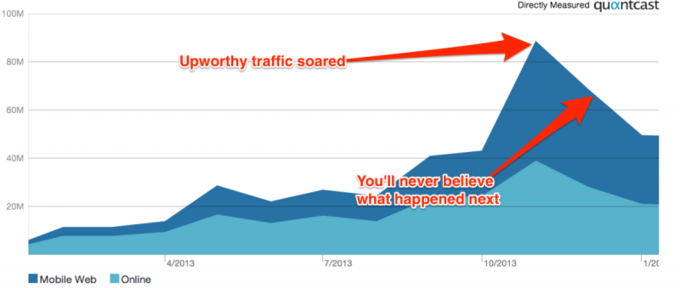Upworthy (original) (raw)
![]()
Submission 36,996
| Navigation |
|---|
| About • History • Highlights • Criticism • Related Memes • Traffic • Search Interest • External References • Recent Images • Recent Videos |
About
Upworthy is a viral content site which focuses on highlighting news stories and media that address some of the more serious discussion topics on the Internet, including a wide range of social justice-related issues like racism, gender relations and economic inequality. Since its launch in 2012, the site has been credited with popularizing the two-phrase headline style, which has been widely criticized for its sensationalist and formulaic nature.
History
Upworthy was launched on March 26th, 2012 by former MoveOn.org executive director Eli Pariser and former managing editor of The Onion Peter Koechley. That day, Pariser and Koechley shared the site's mission statement in their first post titled “Could This Be The Most Upworthy Site In The History Of The Internet?”,[3] stating their goal to spread “important” and “meaningful” content on the web. The mission statement was also accompanied by a humorous infographic visualizing different types of viral content on the Internet (shown below, left) and a Venn diagram illustrating the type of content Upworthy aimed to focus on (shown below, right).
On October 16th, 2012, Upworthy announced they had raised $4 million in funding from the venture captial firm New Enterprise Associates and a collection of angel investors, including BuzzFeed co-founder John Johnson, Facebook co-founder Chris Hughes and Reddit co-founder Alexis Ohanian.
Highlights
ClickHole Parody Site
On April 29th, 2014, The Onion announced plans to launch a parody of viral content websites like Upworthy and BuzzFeed named "ClickHole"[2] in June of that year. As of May 2014, the website contains an infographic image with instructions on how to click on links within a web browser (shown below) directly above a clickable "Click Me!" button with a live-updated counter.
[
Criticism
Upworthy is often criticized for using formulaic, hyperbolic and sensational headlines referred to as "clickbait" to increase viewership. On December 5th, Upworthy[6] published a blog post defending its headline style, arguing that Upworthy traffic is driven by sharing and posting quality content.
Upworthy Headlines
Upworthy Headlines are parody titles that mock those used for content highlighted on Upworthy, which often consist of two phrases with sensational and hyperbolic statements.
Traffic
On June 7th, 2013, the business news site Fast Company[5] published an article declaring Upworthy the "fastest growing media site of all time," citing its rapid growth to 8.7 million monthly unique visitors within the first six months. In November, the traffic analytics service Quantcast[4] reported that Upworthy had reached nearly 90 million people worldwide. Following changes to Facebook's newsfeed algorithm in December, Upworthy visitors plummeted 46% within two months. As of May 2014, Upworthy has a Quantcast United States ranking of 38, reaching nearly 40 million people worldwide.
Search Interest
External References
Recent Images5 total
Recent Videos5 total
Sign up for our Newsletter
This submission is currently being researched & evaluated!
You can help confirm this entry by contributing facts, media, and other evidence of notability and mutation.
About
Upworthy is a viral content site which focuses on highlighting news stories and media that address some of the more serious discussion topics on the Internet, including a wide range of social justice-related issues like racism, gender relations and economic inequality. Since its launch in 2012, the site has been credited with popularizing the two-phrase headline style, which has been widely criticized for its sensationalist and formulaic nature.
History
Upworthy was launched on March 26th, 2012 by former MoveOn.org executive director Eli Pariser and former managing editor of The Onion Peter Koechley. That day, Pariser and Koechley shared the site's mission statement in their first post titled “Could This Be The Most Upworthy Site In The History Of The Internet?”,[3] stating their goal to spread “important” and “meaningful” content on the web. The mission statement was also accompanied by a humorous infographic visualizing different types of viral content on the Internet (shown below, left) and a Venn diagram illustrating the type of content Upworthy aimed to focus on (shown below, right).
On October 16th, 2012, Upworthy announced they had raised $4 million in funding from the venture captial firm New Enterprise Associates and a collection of angel investors, including BuzzFeed co-founder John Johnson, Facebook co-founder Chris Hughes and Reddit co-founder Alexis Ohanian.
Highlights
ClickHole Parody Site
On April 29th, 2014, The Onion announced plans to launch a parody of viral content websites like Upworthy and BuzzFeed named "ClickHole"[2] in June of that year. As of May 2014, the website contains an infographic image with instructions on how to click on links within a web browser (shown below) directly above a clickable "Click Me!" button with a live-updated counter.
[
Criticism
Upworthy is often criticized for using formulaic, hyperbolic and sensational headlines referred to as "clickbait" to increase viewership. On December 5th, Upworthy[6] published a blog post defending its headline style, arguing that Upworthy traffic is driven by sharing and posting quality content.
Upworthy Headlines
Upworthy Headlines are parody titles that mock those used for content highlighted on Upworthy, which often consist of two phrases with sensational and hyperbolic statements.
Traffic
On June 7th, 2013, the business news site Fast Company[5] published an article declaring Upworthy the "fastest growing media site of all time," citing its rapid growth to 8.7 million monthly unique visitors within the first six months. In November, the traffic analytics service Quantcast[4] reported that Upworthy had reached nearly 90 million people worldwide. Following changes to Facebook's newsfeed algorithm in December, Upworthy visitors plummeted 46% within two months. As of May 2014, Upworthy has a Quantcast United States ranking of 38, reaching nearly 40 million people worldwide.



